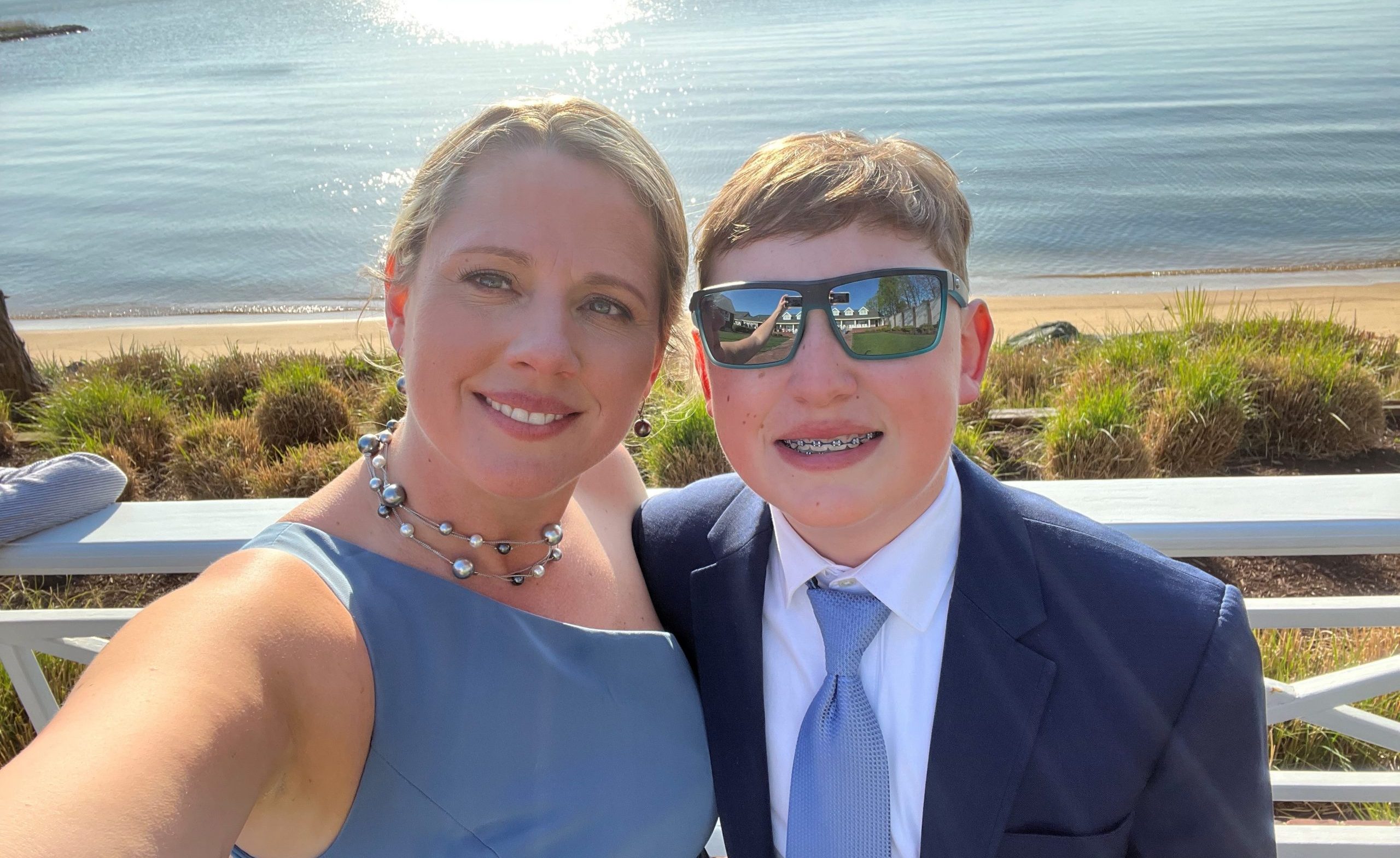An Indomitable Spirit: A Battle Against Recurrent Pericarditis That Defies the Odds
30 May 2023 • 5 minute read

Alexa Ritchie, 25, has spent the better part of a decade in a constant battle against a rare and debilitating illness that would change the course of her life forever: “It became routine that every couple of months I was down for 7 to 10 days.”
Alexa is a first-generation college graduate from Manchester, Vermont who completed her bachelor’s degree in psychology at Castleton University. Alexa has maintained an active lifestyle from a young age, jogging regularly and dedicating herself to year-round soccer for much of her life. She is also an avid reader and journals her life regularly. As she neared the end of her college education, Alexa was looking forward to utilizing her degree and embarking on a successful career. However, in 2020, her world turned upside down as a familiar, but enigmatic pain resurfaced in her chest, forever altering the course of her life. Alexa’s battle with recurrent pericarditis is a testament to her strength and resilience in the face of adversity.
Looking back, Alexa’s journey started in 2016 during her final year of high school. Amid a period of flu-like illness, one morning while preparing for the day an unsettling sensation coursed through her chest with each movement. The discomfort persisted at school and even the simple act of climbing stairs left her breathless and plagued by chest pains. Seeking answers, she consulted her primary physician and tried various flu remedies, but her chest pain persisted for weeks. Alexa recalls the frustration of trying to convey her inability to participate in physical activities, stating, “Every time I tried to be physically active it was worse, and then I’d have to explain to my teacher that my doctor doesn’t know what’s wrong, and I don’t know what’s wrong, but I can’t participate. Finally, after a 10-day prescription of prednisone, to her surprise, the chest pains resolved, offering respite from her ailment.
Fast-forward to 2018 on an autumn day during Alexa’s senior year at college when she woke up feeling unwell with chest pain as well as pressure that she likens to a cat sitting on her chest. During her usual journey from the dormitory to her classes, she found herself gradually losing the ability to breathe and struggling to catch her breath, analogous to the symptoms she experienced in high school, “I could not breathe. I made it up the stairs to the classroom, but I was so out of breath and the pain became so sharp that I knew something was wrong. This time it was heavier, tighter and it was more painful.” Instantly, she reached out to her close friends, one of whom was able to rush her to the emergency room.
Upon her arrival, Alexa was immediately placed in a room, still unable to breathe without difficulty. She endured an agonizing hour before being seen by a doctor; however, following examination her symptoms were dismissed as anxiety or stress, possibly related to being a college student. Alexa felt disheartened by the lack of seriousness accorded to her condition, a common trend she experienced after several visits to doctors over many years, “That first hospital visit was indicative of almost every subsequent hospital visit, up until recently.” Left without satisfactory answers, she left the hospital with a recommendation to take ibuprofen, a commonly used nonsteroidal anti-inflammatory drug, known for its pain-relieving, fever-reducing, and anti-inflammatory properties.
Alexa’s commitment to finding relief from her persistent symptoms led her to meticulously adhere to her medication regimen, setting an alarm throughout the day and night to remind her to take her ibuprofen every four hours. Desperate for any form of relief, she resorted to applying heating and cooling pads to her chest, hoping to alleviate the pain. Sadly, her condition deteriorated to the point where she was confined to her bed for several days, communicating with her professors via email and having to explain her inability to attend class due to her chest pain that was so severe that she felt as though she could not breathe.
In the subsequent couple of years, Alexa’s chest pain flares persisted periodically. Over this time, Alexa was diagnosed on different occasions with anxiety, costochondritis (inflammation of the cartilage that joins your ribs to your breastbone), and gastroesophageal reflux disease (GERD) exacerbated by anxiety. She was prescribed medications to help manage these conditions. Her health care practitioners repeatedly stated that she was a young, healthy athletic woman and it was unusual for someone like her to be experiencing this pain. Furthermore, blood tests, chest x-rays, and echocardiograms or EKG (measures the electrical signals from the heart), repeatedly came back normal. Frustration and sadness permeated her life during this period, as she found herself trapped in a demoralizing pattern, “It became routine that every couple of months I was down for 7 to 10 days. I couldn’t go to class, I couldn’t go to family functions, I couldn’t drive, I couldn’t live my life and I just had to accept it because no doctor could give me an answer.”

On one occasion, Alexa went to a different emergency room in Vermont at the behest of her family and saw a doctor that they knew. “He was the first doctor to say ‘Alexa, I believe your pain’.” He ordered an EKG, and after seeing something abnormal on the EKG, prescribed her valium and also referred her to a cardiologist. Alexa got an appointment with the cardiologist after two weeks and had an echocardiogram at that time. However, by this time her flare had resolved so all that was seen was a healthy 21-year-old heart. “At that point, that’s when I lost the most amount of hope because the doctor looked in depth where my pain was and saw nothing, so I thought it had to all be in my head. That was the point I was the most defeated.”
It wasn’t until 2020 after repeated severe flairs in close proximity that Alexa woke early one morning, drenched in sweat and paralyzed with immobility, “I literally could not move. Anytime I moved, even my fingertips, I felt it throughout my body.” Her mother, Melissa, came to her aid, carrying her into the car and rushing her to the hospital. The car drive etched a harrowing memory she will never forget, “That car ride was the most painful in my life.” When she got to the hospital, the emergency room doctor from her hospital visit earlier in the week promptly ordered a CT scan of Alexa’s chest. The doctor provided a critical revelation—Alexa had a substantial pericardial effusion that was not present earlier in the week. He informed her that she was experiencing shock and was potentially developing a cardiac tamponade (when extra fluid builds up in the space around your heart, putting pressure on your heart) which had to be treated at another center because they could not handle it at that local hospital. She was transferred urgently to the University of Vermont Medical Center (UVM) where she had 600 mL of fluid drained from the sac surrounding her heart and she received appropriate pain medication, but still felt the tightness in her chest due to her flare. It was during this time that the doctor relayed his diagnosis to Alexa: she was suffering from recurrent pericarditis.
Recurrent pericarditis is a medical condition characterized by repeated episodes of inflammation of the pericardium, which is the fibrous sac surrounding the heart. The pericardium normally protects the heart and helps it function properly, but when it becomes inflamed, it can cause chest pain, fever, and other symptoms. Recurrent pericarditis can occur weeks, months, or even years after the first episode and can be more severe than the initial episode. It can be caused by a number of factors, including autoimmune disorders, viral infections, or trauma, and can be treated with anti-inflammatory medications, steroids, and other therapies.
Alexa found herself grappling with a mix of disbelief and relief upon receiving a long-awaited diagnosis. After enduring years of explaining her pain and other symptoms to countless doctors, she was finally provided with a term for her condition, “I didn’t even believe him at that time, even though the doctor finally put a label on it. I started researching my diagnosis and the more I learned the more the dots started connecting and I knew ‘This is me’. I finally had a diagnosis.” The doctor asked about the frequency of Alexa’s flare-up episodes, and when she mentioned having encountered them 10 to 15 times in the past couple of years, he was utterly shocked. He solemnly conveyed to her the gravity of her situation, emphasizing how fortunate she was to be alive and without extreme damage to her heart.
Following a week-long hospital stay, Alexa was discharged, but her journey took an unfortunate turn as she experienced a relapse that required another six-day hospitalization following tapering of the corticosteroid she was prescribed. After being discharged, Alexa started daily injections of an interleukin-1 inhibitor that is FDA-approved but used off-label for recurrent pericarditis. While these injections provided respite from her chest pains, the accompanying side effects and challenges exacted a significant toll on her life, “It worked, but it had a psychological toll of its own. I couldn’t live my life, I had to be home by 5:00 pm every day to inject something that hurts and leaves a major rash. I gained a lot of weight over that year and I could not be fully physically active. I felt like my brain and body were not connected anymore and I did not know who I was. I was not present in my own life.” After more than 365 days of daily injections, Alexa followed up with her cardiologist because she was fed up with the side effects of her treatment which included weight gain, fluctuating hormonal cycle, stress, depression, and the overall negative effect that it had on her relationships. As a result of these ongoing challenges, Alexa sought the support of a mental health professional, but those who were equipped to deal with her specific situation were not covered by her insurance provider. Alexa did find comfort in the excellent care and support of her UVM cardiologist who she views as an important partner in her health journey, and she has received a lot of support from her family and friends at work. She has since transitioned to another interleukin-1 inhibitor that is administered weekly and is FDA-approved to treat recurrent pericarditis. While taking this new treatment for the past year, her pericarditis has been well-managed with flare-ups occurring when treatment is tapered.
Determined not to let recurrent pericarditis define her over the course of her ordeal, Alexa turned to crafting as a way to cope with her day-to-day medical challenges. Drawing inspiration from her community and the memory of a family friend who had died by suicide, she meticulously handcrafted unique and exquisite rings, showcasing them on Instagram. Alexa chose to donate a portion of her profits to a local non-profit, fostering a sense of contribution and conviction, “Even though I was sitting on the couch all day recovering I needed to find something that gave me purpose, and that turned out to be making rings. Before I knew it, I was making a significant income off something that gave me purpose again and allowed me to be creative.” With each ring she sold, Alexa’s customer base grew, enabling her to earn a living and even purchase her own apartment.

Beyond grappling with the physical and emotional hardships imposed by her illness, Alexa also faced the daunting task of obtaining an accurate diagnosis; a situation reminiscent of numerous individuals navigating a chronic ailment. She actively engages with pericarditis communities and helped to create a patient advocacy committee within the Pericarditis Alliance. On these platforms Alexa shares her story, offering encouragement, inspiration, and unwavering support to those locked in their own battles with chronic illness, “Even though your fight isn’t over, you’ve made it through one of the hardest parts of getting answers. Lean on your community to help you stay connected because that’s what got me through it.” Alexa nurtures a multitude of aspirations and envisions ambitious projects aimed at raising awareness about people living with this debilitating disease. Alexa’s advice to those living with a chronic illness or knowing someone that does, is, “You’re not alone, I’m proud of you. If you’re a caregiver, ask your loved one how you can help support them. Just saying ‘How can I help you?’ can make a world of difference.”
Alexa’s story serves as a poignant reminder that, in the midst of adversity, we have the power to embrace life, make a positive impact, and support others in their own battles. Despite numerous misdiagnoses and failed therapies, Alexa’s relentless pursuit of answers and determination to find the right treatment exemplify her unwavering spirit. Alexa hopes her story serves as an inspiration for others who may be navigating similar challenges, “My hope is for a world that accepts and understands people living with a chronic illness, not just pericarditis, but any chronic illness. It’s not by our choice that our medical condition may be difficult to diagnose and treat, but it’s the cards we are dealt. What we go through: the battles with insurance, the battles with work, the battles with education, we go through so many extra hoops to live a normal life. Plus, the battles with healthcare and the lack of knowledge of this disease – change needs to happen in our healthcare system.”

Pericarditis Alliance
The Pericarditis Alliance is a nonprofit organization dedicated to the diagnosis, management, and treatment of pericardial disease through research, education, and support for patients and healthcare providers.


